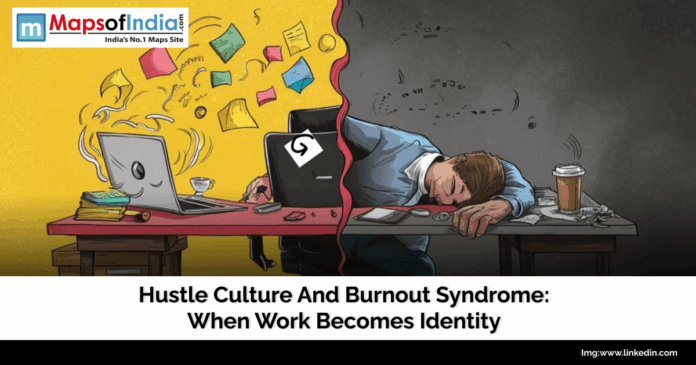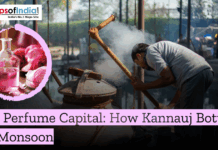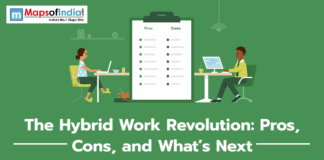Hustle culture is a culture that promotes relentless work. It equates success with endless productivity. Social media glorifies the culture. Posts about early mornings and late nights inspire millions. The self-help reels are gaining their follower base. But this mindset also has a dark side. Burnout syndrome is on the rise nowadays. It leaves workers physically and mentally drained. When work becomes identity propels personal well-being erodes. Balance in relationships and health starts to suffer.
What Is Hustle Culture?
Hustle culture worships constant work. It promotes the idea that success demands sacrifice. The rest is seen as laziness and not a necessary thing. Social media platforms like Instagram and X are amplifying this trend. Influencers share schedules packed with tasks. They boast about 4 a.m. wake-ups. The phrase “rise and grind” is a mantra. Youth is becoming the target of this trend. They want success, and they are thinking this is the right way. Smartphones have blurred the lines between work and life. Emails ping at midnight. Tasks follow us everywhere. Competitive industries like tech and finance are surviving on this mindset. Hustle culture ties self-worth to output. It redefines identity through job roles. This relentless drive sets the stage for burnout.
Understanding Burnout Syndrome
Burnout is chronic exhaustion from prolonged stress. It’s more than feeling tired. The World Health Organization classifies it as an occupational phenomenon. Burnout symptoms include physical fatigue and emotional detachment, which lead to reduced performance. Workers feel overwhelmed. Workers’ motivation starts to fade. Cynicism creeps in. According to a recent study, 74% of employees experienced burnout. Heavy workloads are a key trigger. Lack of support from management has worsened this. Unrealistic deadlines add pressure on them. Physical symptoms like headaches and insomnia emerge. Mental fog clouds the decision-making ability of an individual. Burnout affects all sectors. When work defines identity, then failure feels personal. This deepens the emotional toll. Burnout is a signal to pause and reassess.
How Hustle Culture Fuels Burnout
Hustle culture normalises overwork. It praises long working hours as dedication to work. Taking breaks feels like failure. On social media, many Posts glorify packed calendars and sleepless nights. According to a recent study 60% of workers felt pressured to work overtime. Constant connectivity via email and social media fuels the problem. Smartphones keep work at our fingertips. Notifications disrupt evenings and weekends. This erodes boundaries. Hustle culture links self-worth to productivity metrics. Missing a goal feels like a personal flaw. You are lacking somehow. Stress accumulates silently. Burnout becomes inevitable. Self-help courses are getting a big fan base on online learning platforms. The cycle is hard to break. Society’s admiration for hustle perpetuates it. Workers feel trapped in the grind.
The Psychological Toll of Burnout
Burnout is disturbing the mental health of the current workforce. Chronic stress triggers anxiety disorders. A study suggested that burnout can lead to a 20% higher risk of depression. Workers feel detached from their jobs. Passion turns to apathy. Self-esteem lowers when work defines identity. Guilt over taking rest adds pressure. Sleep suffers. Work only becomes a priority in life. Poor rest worsens mood swings. 65% of burnout workers are suffering from insomnia. Some turn to unhealthy coping mechanisms. Overeating or alcohol is their way of finding relief. Therapy can help. Cognitive behavioural therapy (CBT) reframes negative thought patterns. Mindfulness reduces stress. Early intervention prevents long-term damage. Burnout’s mental toll requires serious attention.
Impact on Relationships and Personal Life
Hustle culture also disrupts personal relationships. Long hours of work steal time from family. Partners feel ignored or undervalued. Couples feel that work stress is a common reason for conflict. Friends fade into the background. There is no social life due to deadlines. Workers prioritise completing a given task over finding meaningful connections. Burnout deepens isolation. Exhaustion leaves no energy for bonding. Nowadays, People don’t have Hobbies like painting or hiking. These hobbies are disappearing. Personal identity has now become only job titles. According to a survey, 55% of workers skipped vacations due to work pressure. This imbalance in work and personal life is making people suffer. Activities like phone-free evenings are helpful. Open communication rebuilds bonds. Relationships need time and presence. Hustle culture makes that challenging.
Who Is Most Affected by Hustle Culture?
Young professionals are hit hardest by this trend. Millennials and Gen Z embrace hustle as a part of working culture. They seek rapid career growth, and that’s their definition of success. Social media shapes their views on success. 77% of millennials reported burnout. Women face unique pressures. They often balance work with caregiving. 62% of working mothers experienced burnout. Gig economy workers are vulnerable too. Freelancers hustle to secure contracts. High achievers in competitive fields suffer the most. Fields like Tech, law and healthcare report burnout the most. Urban work culture is more stressful than the rural one. The cultural norm of this trend has amplified the issue. Societies that value productivity, like the US and Japan, see a higher rate of burnout. Targeted support is essential.
How to Manage and Overcome Burnout
Breaking free from hustle culture takes effort. First we need to set clear boundaries between personal space and work space. Define work hours and stick to them. Say no to non essential tasks. boundary-setting reduced stress by 25%. Identify your Priorities. Aim for seven to eight hours of sleep. Exercise boosts endorphins. A 30 minute walk daily can lift mood. Try to find a hobby that suits you. Reading or gardening restores balance. Mindfulness practices like meditation calm the mind. Therapy can also be helpful. CBT reframes work’s role in identity. Supportive workplaces matter. Flexible hours and mental health days help. Companies can promote work-life balance. Workers must redefine success. Value well-being over output. Small and consistent changes break the cycle.
Conclusion
Hustle culture glorifies work but it comes with a heavy cost. Burnout syndrome drains mental and physical health. It fractures personal relationships and reduces work-life balance. Young professionals like women and gig workers face high risks. Social media and constant connectivity among people add fuel to the problem. But solutions are also within reach. Set boundaries between work and personal space. Take a proper rest and therapy rebuilds well-being. Companies must foster balance with supportive policies. Success should not come at the cost of personal well being. Identity is more than a job title. Awareness and action break the hustle cycle. Prioritising health can lead to productivity. Life deserves more than the grind. Balance is the path to thriving.





